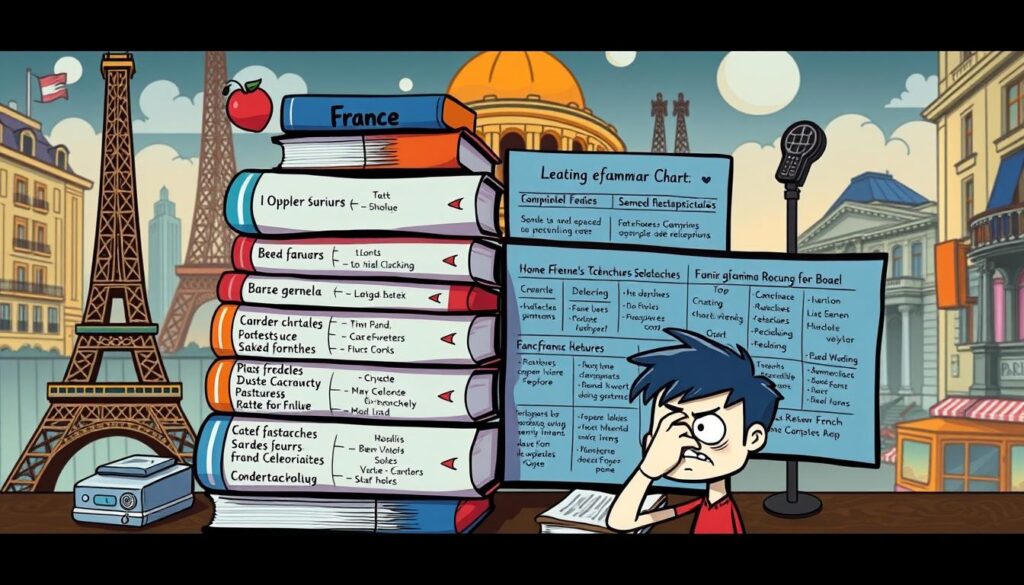Thinking about learning two languages at the same time, like French and Spanish? It’s exciting to think about how this could improve your ability to communicate and expand your view of the world. However, learning a new language is serious business. It takes real commitment, a good plan, and a readiness to dive deep into foreign language learning.
French and Spanish share Latin roots, which might make them seem like a good pair to learn together. They have similar words and grammar, which could make your learning faster. But, there’s also a chance of getting mixed up. So, it’s key to know how to use their similarities to your advantage, without getting confused.
Are you up for the challenge of learning both at the same time? You can find out more at Language Yard.
If you’re thinking about learning French and Spanish together, look at the facts. Learning languages one after another usually leads to better results. This means getting good at one language before starting another. Yet, if you’re really driven, learning both could offer big rewards. It can make you sharper and open up more job opportunities in areas like international business and tourism.
Choosing to learn both languages could really boost your brainpower. It can improve problem-solving and make you more flexible in thinking. But to succeed, you need to focus, manage your time well, and set clear goals. By knowing the pros and cons, you can make a smart choice about this rewarding learning journey.
Is It Bad to Learn French and Spanish at the Same Time?
Learning French and Spanish at the same time is a big challenge but also very rewarding. It doesn’t hurt your language skills but improves them. You’ll get better at learning languages and boost your brain power.
When starting to learn both at once, having a plan is key. Every language has its own sounds, grammar, and words. Knowing this helps avoid mix-ups and makes your learning stronger.
- Enhanced Memory: Managing two languages like French and Spanish keeps your memory sharp.
- Cognitive Flexibility: Handling two languages boosts your problem-solving and flexibility.
- Improved Attention Span: Learning both at once enhances your focus and multitasking skills.
Being consistent and dedicated helps a lot in learning languages. A good daily routine for both French and Spanish makes learning smoother and faster.
| Feature | French Learning | Spanish Learning |
|---|---|---|
| Vocabulary Similarity | 75% | 35% |
| Recommended Tools | Netflix, Memory Palace | Newsdle, Mnemonics |
| Key Learning Technique | Interleaving | Spaced Repetition |
| Cultural Insight | Literature, Philosophy | Art, Culture |
Plan well, use the right tools like Newsdle, and apply smart tactics. This way, you can become good at both French and Spanish. Learning these languages opens up many opportunities, both personally and professionally.
Your own goals for learning and your interest in the languages will keep you moving forward. It’s definitely possible and worthwhile to learn French and Spanish together.
Unveiling the Benefits of Bilingual Language Learning
Learning two languages isn’t just about talking to more people. It also brings many mental, personal, and work-related benefits. This article looks at the upsides of knowing languages like French and Spanish. We’ll see how it helps with thinking, job chances, and understanding other cultures.
The Cognitive Advantages of Multilingualism
Learning several languages has big mental benefits. Studies show that people who know more than one language have better memory, pay attention longer, and solve problems better than those who know only one language. Kids who grow up learning two languages can easily tell them apart without getting mixed up. They’re also better at picking up on how people mean different things based on how they say them. This makes them better at talking to others and understanding them.
Enhanced Career Prospects and Cultural Awareness
Knowing more than one language can really help your career. It makes you stand out in the job market. Many jobs, especially in international work, health care, and business, value language skills highly. Also, people who speak several languages are more aware of different cultures. They know how to act and respect other ways of life easily.
Getting better at languages can also make you appreciate cultures more. This leads to a wider view of the world and personal growth. It’s important to understand and respect cultural details today. And having language skills is a key part of that.
Using smart language learning methods and mind tricks can make learning faster. You can do this in regular classes, online, or by surrounding yourself with the language. Each step towards bilingualism improves your thinking and social skills.
| Benefit | Cognitive | Professional | Personal |
|---|---|---|---|
| Enhanced Memory | Yes | ||
| Improved Problem-solving Skills | Yes | Yes | |
| Cultural Sensitivity | Yes | Yes | |
| Better Career Opportunities | Yes | ||
| Broader Global Perspective | Yes |
About one in three people worldwide speak two or more languages. This number is growing, especially in places like California and cities like Toronto. It shows more people and schools see the value of learning more than one language. They view it as a key step forward in education around the world.
Overall, learning another language gives you more than just new words. It improves your mind, job prospects, and understanding of others. This is true both in your personal life and at work.
Comparing Language Acquisition Processes for French and Spanish
Learning multiple languages, like French and Spanish, is a journey. It’s important to understand how different their learning processes are. Both languages come from Latin roots. This gives learners similar words and structures, speeding up learning. But, you must be careful not to mix them up due to their similarities.
Learning a foreign language is more than just grammar. It involves effective strategies too. For better fluency, split your study time between grammar and real-life practice.
Florida Atlantic University says learning two languages at once might take longer. Yet, it has great benefits for your brain in the long term.
| Aspect | French Acquisition | Spanish Acquisition |
|---|---|---|
| Pronunciation | Nasal and muted vowels | Strong, clear vowels |
| Grammar | Complex conjugations | Simpler conjugative structures |
| Vocabulary | Many English cognates | Extensive Latin-derived cognates |
| Cognitive Load | Higher due to grammatical complexity | Lower, more straightforward |
When mastering multiple languages, time management is key. It helps avoid the issue of preferring one language over another. Interestingly, 40% of learners struggle with dividing their time, highlighting the need for a good study plan.
Engaging with languages in real-life scenarios is also crucial. Around 60% of learners say this approach, like traveling or talking with native speakers, improves learning. Resources from the Foreign Service Institute can also enhance learning French and Spanish, by providing balanced education methods.
Finally, appreciating the unique aspects of each language, while using their common ground, can enrich your learning. It sets you on the path to fluency in both French and Spanish.
Language Learning Strategies: Doubling the Efficiency
Learning French and Spanish at the same time has its unique challenges. It demands a special strategy to make language learning more effective. While some experts suggest learning languages one after the other, managing two simultaneously changes things. You need to carefully divide your resources to avoid negatively impacting your learning.
Research dispels the myth that our brains can’t handle learning two languages well at once. Actually, as you get better, your brain adjusts impressively. This shows your cognitive resources are more adaptable than you might think as you reach higher levels of proficiency.
Time Management and Study Routines
Effective multitasking in language learning starts with good time management. Use an 80/20 approach. Spend most of your study time on one language and a smaller amount on the other. This keeps your schedule manageable and your willpower intact. Having a plan that’s both structured and flexible lets both languages progress well.
It’s worth noting that 600 classroom hours could lead to professional fluency. So, organizing your study time wisely is crucial for efficient language learning strategies.
Practical Tips for Juggling Multiple Languages
Moving from beginner to intermediate levels, you can boost learning by mixing passive learning with fun. Engage with platforms like Clozemaster, follow news, and use various media to immerse yourself fully in French and Spanish. This helps deepen your familiarity in an enjoyable way.
As you aim for advanced proficiency, balance your focus between learning broadly and practicing specific weak areas. This shift from a wide to a more focused approach helps. Mastering one language well sets a foundation, making it easier to learn others without harming your progress.
For insights on learning two languages at the same time, check out the research at Clozemaster. It offers deep understanding on how this benefits your brain and provides tips for successful bilingual learning.


